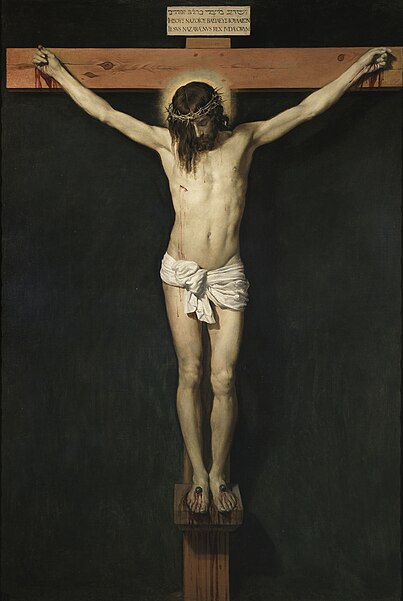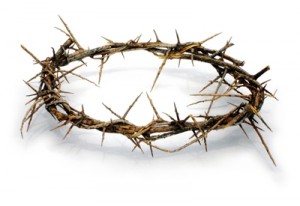The Fuzzy Math of Penal Substitution
One of the hallmarks of evangelical theology is the concept of penal substitution. Basically this is a form of substitutionary atonement theory which states Jesus died on the cross in place of sinners in order to satisfy the penalty of their sin. In other words, the death of Christ is substituted for the punishment sinners should receive (which is generally understood to be “death” and separation from God.) Christ takes our punishment so we can be forgiven. When you hear a pastor say “Christ died for my/your sins” what you are hearing is an articulation of substitutionary atonement.

Crucifixion, D. Velázque, 17th c.
This idea of atonement has origins going back to the early church fathers, but its formal outline is generally attributed to the 11th century monk Anselm of Canterbury who preferred to talk of “satisfaction” rather than of “substitution” (Christ’s death was a satisfactory sacrifice for our sins rather than a substitution for the penalties of our sins). It was further developed and brought to wide spread acceptance by John Calvin and the reformers. It should be noted that while penal substitution is certainly favored by evangelical (especially reformed) Christians/churches/theologians, it is not the only theory of atonement. Two of the other major atonement theories are: Moral influence (Christ’s death show perfect obedience and love), and Ransom / Christus Victor (Christ was the ransom for humanity’s debt to Satan.) Other theories often combine / tweak concepts found in these approaches.
Penal substitution is based on a few premises.
- God requires punishment for our sins to be forgiven. (If you go with Anselm’s satisfaction concept, you would say God requires sacrifice for our sins to be forgiven).
- The death of Christ covers the punishment / sacrifice for all sinners.
It is with this second point that things get tricky. First, we must ask, “who is covered by this.” Those in the reformed camp will say it is only for the elect — that is, those whom God has predestined to be saved. Those in the free will camp will say it available for all, but only effective for those who trust in Jesus. Finally, those in the universalist camp will say all people are covered regardless of status. When we begin to ask who is covered by the sacrificial act of the cross, we begin to get into the fuzzy math of substitutionary atonement theory.
This leads me to a question I have pondered for years and have yet to hear a satisfactory answer:
How can the death of one person be the acceptable substitute for the sins of all humanity?
Let’s walk through the court room imagery upon which this theory is based. So I die and stand before my creator. God says to me, “It looks like you have sinned and thus you must be punished.” At that point Jesus comes in and says, “I don’t want him to be punished, since I have lived a sinless life, let me stand in his place.” Jesus is then led to the cross and crucified.
Okay, that works out great, until the next sinner comes before the throne of judgment. Presumably Jesus is allowed to stand in my place because he lived a sin free life and is the only person in the history of the world who does not deserve punishment / judgment for sin. His life for mine – its a fair trade. But now that Jesus’ perfect life has been traded for my life, what is left to be traded (substituted)?
The problems don’t stop there. If we are truly talking about the substitution of a penalty, we must examine the trade closer. In the way this theory is generally taught, we avoid damnation (judgment) because Christ voluntarily died on the cross. But, we must admit this is not a fair trade. Christ experienced physical death that lasted 3 days. Sinners on the other hand would experience eternal damnation (in addition to physical death) if it was not for the work of Christ. Again… this does not seem to be a fair trade.
So at the end of the day, the equation looks like this:
3 Days of physical death by sinless man = eternal damnation for countless people and their lifetimes of sin
I am sorry, but that math just doesn’t work out.
The books are obviously being cooked in some way. I have heard people claim that this equation still works because it was not just a man who died, but it was God himself. That seems logical, but then at the end of the day we still run into problems. How can it be a trade if God in fact did not die and did not experience damnation. The need for judgment still has not been satisfied. And, if we assume that this equation meets God’s standards so God can still be just, we must ask why it had to happen at all. If God can determine what meets the standards of a fair trade, it can be assumed that he could also waive the need for a penalty.
Now lets get back to another question: who is covered by this act? Even if somehow the math works out, and the death of one god-man can cover infinite sinful lives, then why wouldn’t this lead to universal salvation? Why must people individually accept this sacrifice? If it has the power to cover the sins of all, then why would it not be extended to all, especially if we believe God desires none to perish. (There are certainly some people who think that God does in fact desire some to perish, but that is an entirely different conversation into the nature of a loving God.)
The problem is not alleviated if you take Anselm’s view of satisfaction over substitution. It does answer a few more questions because the Old Testament does teach of a sacrafice that covers an entire group of people (i.e. on the Day of Atonement) but at the end of the day you run into the same problems concerning who is covered by this act (along with some new problems: Does God allow for, and indeed propagate, human sacrifice?).
I will be the first to admit, these are not easy questions and I do not profess to have the answers. The things we are dealing with here are of the utmost theological importance. We are talking about the very nature of Christ, his mission, and its effect on our relationship with God. When we talk about atonement, we are talking about how God interacts with and responds to humanity and vice versa. This is no minor matter.
But at the same time, I fear we have all to often assumed the only orthodox understanding of atonement is that of penal substitution without first examining the workings of such a theory. Its not that I reject this approach, its that I don’t understand it. This post is a sincere effort to work through my questions and I invite all my friends who take this approach to help me understand it.
